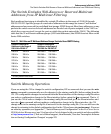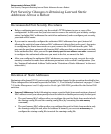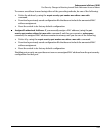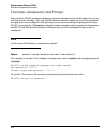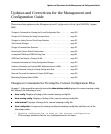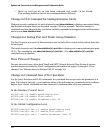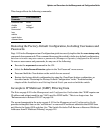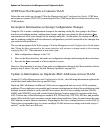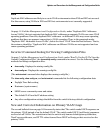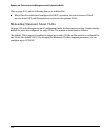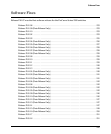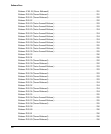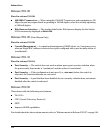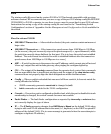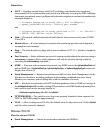
224
Updates and Corrections for the Management and Configuration Guide
Note
Duplicate MAC addresses are likely to occur in VLAN environments where XNS and DECnet are used.
For this reason, using VLANs in XNS and DECnet environments is not currently supported.
On page 11-10 of the Management and Configuration Guide, under "Duplicate MAC Addresses
Across VLANs", the text suggests that duplicate MAC addresses on separate VLANs can cause VLAN
operating problems. However, duplicate MAC addresses on different VLANs may cause operating
problems that have no apparent connection to VLAN operation. Thus, in the paragraph under
"Duplicate MAC Addresses Across VLANs", delete the word "VLAN" from the first sentence. That is,
the sentence should be: "Duplicate MAC addresses on different VLANs are not supported and can
cause operating problems."
Incorrect Command Listing for Viewing Configuration Files
On page C-4 of the Management and Configuration Guide, under "How To Use the CLI To View the
Current Configuration Files", the
show startup config command is incorrect. Use the following "show"
methods for listing configuration files:
■ show config : Displays the startup-config file.
■ show config run : Displays the running-config file.
(The
write terminal command also displays the running-config file.)
The
show config, show config run, and write terminal commands list the following configuration data:
■ Daylight Time Rule setting
■ Hostname (system name)
■ SNMP server community name and status
■ The default VLAN and its IP address setting
■ Any other configuration settings that differ from the switch’s factory-default configuration.
New and Corrected Information on Primary VLAN Usage
The second bulleted item on page 9-54 incorrectly states that "The switch reads DHCP responses on
the primary VLAN instead of on the default VLAN." The switch reads DHCP (and Bootp) responses
received on all VLANs. The restriction is that the switch only honors default gateway addresses,
TimeP server addresses, and IP TTL values learned from DHCP or Bootp packets received on the
primary VLAN.



